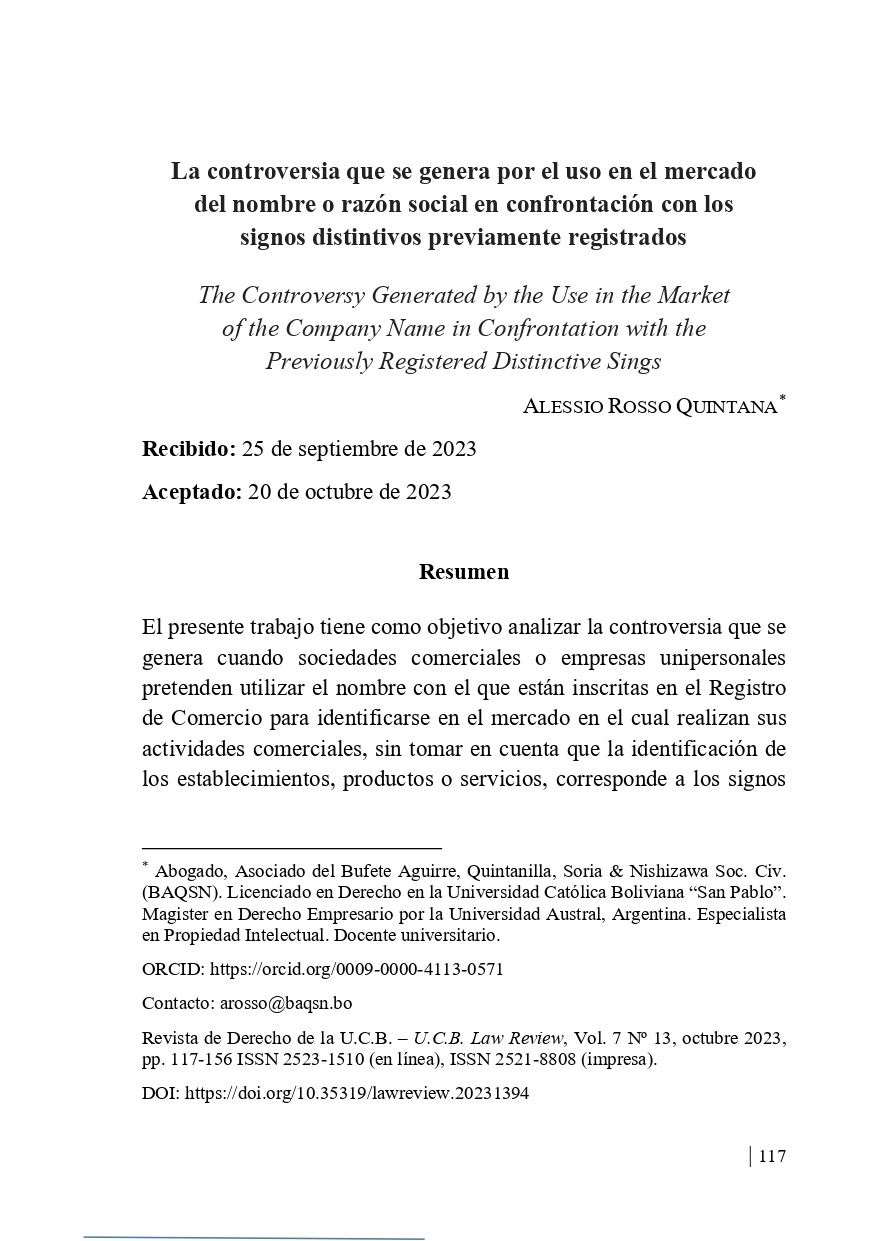The Controversy Generated by the Use in the Market of the Company Name in Confrontation with the Previously Registered Distinctive Sings
DOI:
https://doi.org/10.35319/lawreview.20231394Keywords:
Company name, distinctive signs, tradename, distinctiveness, infringement of industrial property rights, unfair competitionAbstract
The objective of this paper is to analyze the controversy that arises when commercial companies or merchants try to use the name with which they are registered in the Commercial Registry to identify themselves in the market in which they carry out their commercial activities, without taking into account that the identification of establishments, products or services, corresponds to the distinctive signs, whose registration is the responsibility of another public entity, different from that of the Commercial Registry. Taking into account that the legal nature of the merchant's name is different from that of the distinctive signs, given that the purpose of the company name is to individualize the merchant as a subject of rights, while the tradename identifies an economic activity and the trademarks products or services, it is very likely that conflicts arise between these merchants and third parties that have acquired a prior right regarding any distinctive sign that may be affected by this situation. Therefore, we consider important and necessary to take this situation into consideration and to analyze preventive and corrective measures in order to avoid future contingencies.
Downloads
References
Audiencia Provincial Murcia [APM]. Sentencia 00723/2018 de 8 de noviembre de 2018. Murcia, España. https://www.poderjudicial.es/search/AN/openCDocument/50d3cdda6efb1949fa06cbe15ab1125a45cc0a44f4ddccc5
Corte Suprema de Justicia de la Nación [CSJN]. Fallos 211:559 del 07 de julio de 1948. Argentina. https://sjservicios.csjn.gov.ar/sj/tomosFallos.do?method=iniciar
Decisión 486 de 2000. Sobre el régimen común sobre propiedad industrial de la Comunidad Andina de Naciones. 14 de septiembre de 2000.
Decreto 14379 de 1977 [con fuerza de ley]. Por medio del cual se expide el Código de Comercio [C.COM.]. 25 de febrero de 1977 (Bolivia).
Decreto Supremo 27938 de 2004. Organización y funciones del Servicio Nacional de Propiedad Intelectual - SENAPI. 20 de diciembre de 2004 (Bolivia).
Decreto Supremo 28152 de 2005. Organización y funciones del Servicio Nacional de Propiedad Intelectual - SENAPI. 17 de mayo de 2005 (Bolivia).
Decreto Supremo 4596 de 2021. Crea el Servicio Plurinacional de Registro de Comercio - SEPREC. 06 de octubre de 2021 (Bolivia).
Ley 1788 de 1997. Por la cual se crea el Servicio Nacional de Propiedad Intelectual - SENAPI. 16 de septiembre de 1997 (Bolivia).
Martínez-Villalba, J. C. R. (2014). Teoría general de los signos distintivos. Rev. Prop. Inmaterial, 18(191). https://ssrn.com/abstract=2535849.
Morales, C. (1990). Código de comercio concordado y anotado con arreglo a la edición oficial. Editorial Gisbert.
Otamendi, J. (2017). Derecho de Marcas. Editorial Abeledo Perrot.
Real Academia Española, (s.f). Signo Distintivo. En Diccionario panhispánico del español jurídico. 25 de agosto de 2023. https://dpej.rae.es/lema/signo-distintivo.
Real Academia Española, (s.f). Razón Social. En Diccionario panhispánico del español jurídico. 06 de octubre de 2023. https://dpej.rae.es/lema/raz%C3%B3n-social
Resolución Administrativa SEPREC 024/2022 de 2022 [Servicio Plurinacional de Registro de Comercio – SEPREC]. Guía de tramites de registro de comercio. 28 de marzo de 2022 (Bolivia).
Resolución Administrativa J-015/2008 de 2007 [Servicio Nacional de Propiedad Intelectual -SENAPI, Dirección General Ejecutiva]. 29 de agosto de 2007 (Bolivia).
Rodríguez-Cano, A. B. (2021). Introducción a las marcas y otros signos distintivos en el tráfico económico (Vol. 1318). ARANZADI/CIVITAS.
Tribunal de Justicia de la Comunidad Andina [TJCA]. Interpretación prejudicial 544-IP-2015. 19 de agosto de 2016.

Downloads
Published
How to Cite
Issue
Section
License

This work is licensed under a Creative Commons Attribution-NonCommercial-ShareAlike 4.0 International License.
The U.C.B. Law Review is an Open Access Journal, therefore, it is full free for access, reading, search, dowload, distribution and lawfull reuse in any medium only for non-comercial purposes, provided the original work is properly cited.








